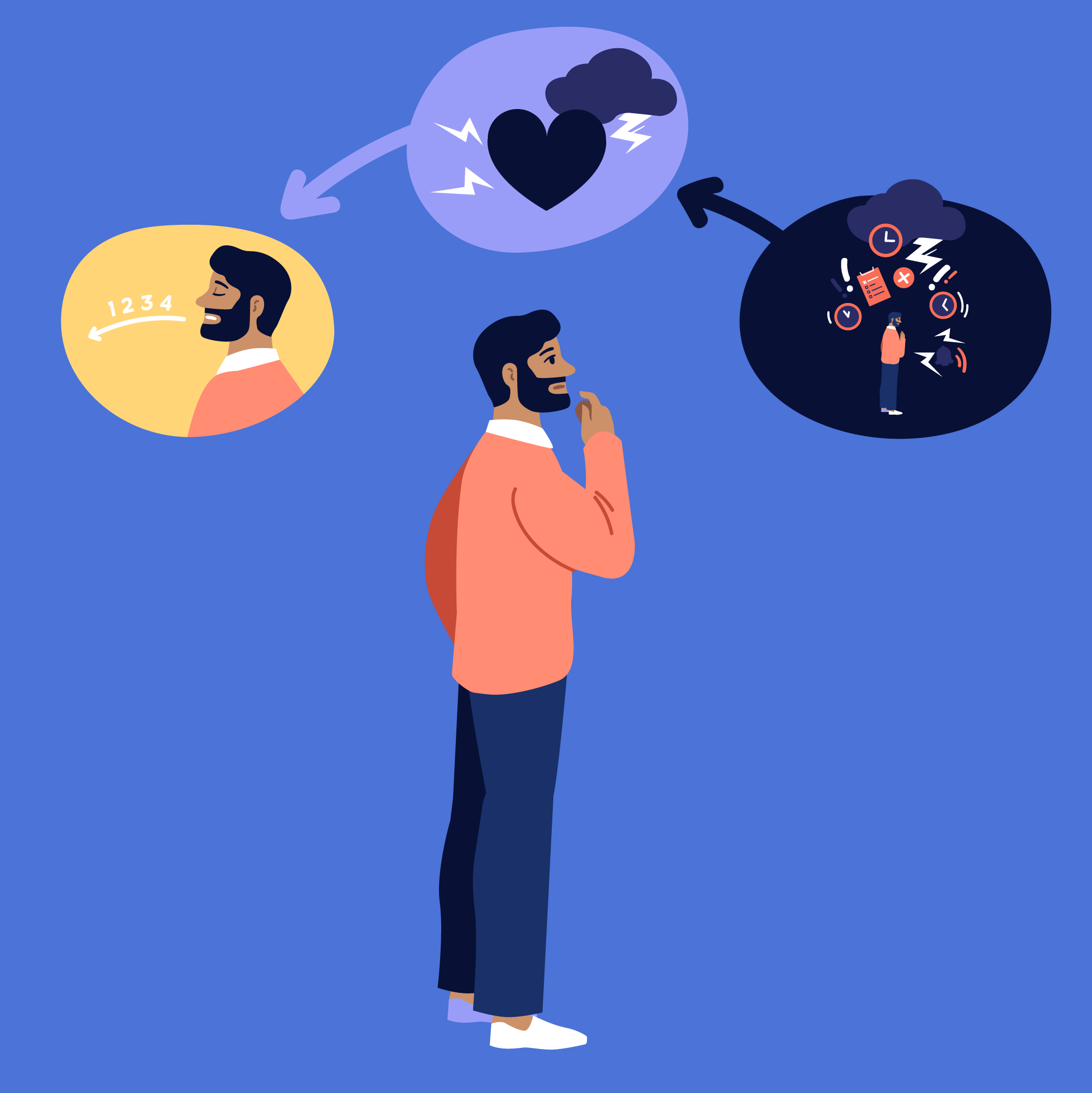Acceptance and Commitment THErapy (ACT)
Acceptance and Commitment Therapy (ACT) is a form of Cognitive Behavioral Therapy (CBT). ACT focuses on the concept of psychological flexibility. This is the ability to stay in the present moment and adapt to changing situations. It's about accepting your thoughts and feelings without judgment, and acting in line with your values.
The therapy uses six core processes to achieve this. These are Cognitive Defusion, Acceptance, Contact with the Present Moment, Observing the Self, Values, and Committed Action. Together, they form the hexaflex model, a visual representation of ACT's principles.
ACT is not just about reducing symptoms. It's about creating a rich, full, and meaningful life, while accepting the pain that inevitably comes with it.
It's used to treat a variety of mental health issues, including anxiety, depression, and PTSD. But its principles can also be applied in non-clinical settings, like the workplace or schools.
Our mental health professionals are here to help you, whether you need to heal or want to thrive.
Get in touch to find out how we can help you. Contact us however you feel most comfortable, for example Whatsapp message us, or feel free to call us on +971 56 895 2347. You can also email or simply send us a query via our online form. Instagram message, Facebook chat… whatever works best for you!
Our goal is to make you comfortable.
The Evolution of ACT: From Theory to Practice
ACT was developed in the 1980s by psychologist Steven Hayes. It was born out of his own struggle with panic disorder.
The therapy is grounded in Relational Frame Theory, a theory of language and cognition. This theory suggests that the way we use language shapes our experience.
Over the years, ACT has evolved and been refined. Today, it's recognized as an effective therapy for a range of mental health issues. It's also used in non-clinical settings to improve well-being and performance.
The Six Core Processes of ACT and the Hexaflex Model
ACT is built around six core processes. These processes are represented in the hexaflex model.
The first process is Cognitive Defusion. This involves learning to see thoughts as just thoughts, not facts. It's about creating some distance from our thoughts.
The second process is Acceptance. This means making room for difficult feelings and sensations. It's about allowing them to be there without trying to control them.
The third process is Contact with the Present Moment. This involves being fully aware of your here-and-now experience. It's about being engaged in what you're doing instead of being lost in your thoughts.
The fourth process is Observing the Self. This is about connecting with a sense of self that is constant and unchanging. It's about seeing yourself as the context in which thoughts and feelings occur.
The fifth process is Values. This involves discovering what is truly important to you, what you want your life to be about.
The sixth process is Committed Action. This means taking action guided by your values. It's about doing what matters, even if it's difficult or uncomfortable.
These six processes are interconnected and mutually supportive. They work together to increase psychological flexibility, the ultimate goal of ACT.
Psychological Flexibility: The Ultimate Goal of ACT
Psychological flexibility is the main goal of ACT. It's about being open, present, and engaged in life. It's about being able to adapt to changing situations and to act in line with your values.
Psychological flexibility allows you to handle painful thoughts and feelings effectively. It helps you to not let them control your actions. Instead, you can choose your actions based on what matters to you.
In essence, psychological flexibility is about embracing life as it is, not as we wish it to be. It's about living a life that is rich, full, and meaningful, even in the presence of pain and struggle.
ACT vs. Traditional CBT: Understanding the Differences
ACT and traditional Cognitive Behavioral Therapy (CBT) both fall under the umbrella of cognitive therapies. However, they differ in their approach to thoughts and feelings.
CBT focuses on changing negative thoughts and feelings. It aims to replace them with more positive or realistic ones. On the other hand, ACT does not aim to change thoughts or feelings. Instead, it teaches you to accept them without judgment.
The goal of ACT is to increase psychological flexibility. This allows you to live a meaningful life, even in the presence of negative thoughts and feelings.
Applying ACT: From Therapy to Everyday Life
ACT is not just for therapy sessions. Its principles can be applied to everyday life. This makes it a versatile tool for personal development and stress management.
For instance, you can use ACT principles to improve work performance and job satisfaction. By accepting negative thoughts and feelings, you can focus more on your tasks. You can also use your personal values to guide your actions at work.
ACT can also be used for chronic pain management. It helps you accept the pain and live a fulfilling life, despite the discomfort.
The Role of Mindfulness in ACT
Mindfulness is a key component of ACT. It involves being fully present in the moment. This helps you to engage fully with your experiences, rather than avoiding them.
In ACT, mindfulness is used to foster acceptance. It helps you to embrace your thoughts and feelings without judgment. This is a crucial step towards psychological flexibility.
Moreover, mindfulness in ACT is not just about meditation. It's about being aware of your actions, thoughts, and feelings in everyday life. This awareness can help you make choices that align with your values.
Embracing Your Values Through Committed Action
In ACT, values are seen as chosen life directions. They guide us towards meaningful action. Identifying your values is a key step in the ACT process.
Once you've identified your values, the next step is committed action. This involves taking concrete steps that align with your values. It's about making a commitment to act in ways that enrich your life.
Remember, committed action is not about achieving specific goals. It's about living in accordance with your values. This can lead to a more fulfilling and meaningful life.
What it can help with
CBT can be used to treat a wide range of problems. It is generally the most popular and preferred type of therapy as it can quickly help you cope with a variety of challenges.
CBT has been proven to be effective in treating mental health disorders such as:
Mood disorders (including depression and bipolar disorder)
Anxiety disorders (including Post Traumatic Stress Disorder, social anxiety, and panic disorder)
Relationship issues
Thrive Specialists in ACT
Dr. Kate Prozeller
Licensed Psychologist
Dr. Kate Prozeller is a CDA-licensed psychologist. She holds her PsyD in Counseling Psychology from Saint Mary’s University in the United States. Dr. Kate provides individual therapy to adults, couples therapy, and English-language art, sand, and play therapy to children and adolescents. Prior to relocating to Dubai in 2019, she has worked as a psychologist in the United States, serving a variety of patient populations and across hospitals, private practice, and university settings.
Dr. Chasity O’Connell
Licensed Psychologist & Clinical Advising Director
Dr. Chasity O’Connell is a CDA-licensed Psychologist and the Clinical Advising Director at Thrive Wellbeing Centre. She has more than 10 years of experience in supporting individuals, couples, and families.
Dr. Marina Hakimian
Licensed Psychologist
Dr. Marina is a CDA-licensed psychologist who specializes in working with children and families. She provides art, play, and sand tray therapy for children as well as psychotherapy for adolescents. Marina also works with parents and adults.
Cynthia Ghosn
Psychology Technician & Early Career Professional
Cynthia is a DHA-licensed Psychology Technician. She is in the process of completing her Ph.D. in Clinical Psychology at Meridien University in the USA. She works with adolescents and adults who are experiencing anxiety, depression, burnout/stress, life transitions, and relationship issues. Cynthia is part of our Early Career Professional (ECP) program, which means that she works closely under the supervision of Clinical Advising Director, Dr. Chasity O’Connell. In an effort to make therapy more accessible and support the growth and development of clinicians in the field, we are offering an adjusted pricing structure through our ECP program.
Joslin Gracias, M.A.
Licensed Psychologist
Joslin is a CDA-licensed psychologist. She holds an M.A. in Clinical Psychology from S.N.D.T. University in India. Joslin works with adolescents, adults, and couples who are experiencing depression, anxiety, relationship difficulties, trauma, and burnout/stress.
Corina Saramet, M.A.
Licensed Psychologist
Corina is a CDA-licensed psychologist specializing in working with adults and adolescents (16+). She obtained her Master’s Degree in Cognitive Behavioral Psychotherapy at the University Titu Maiorescu in Romania. Her areas of expertise include anxiety disorders, depression, grief and loss, trauma, and stress.
Dr. Dana Jammal
Licensed Psychologist
Dr. Dana is a UK-trained HCPC registered Counselling Psychologist who completed her doctorate training at City, University of London. She also holds a Master of Science degree in Mental Health Studies from the Institute of Psychiatry, Psychology and Neuroscience at King’s College London and a Bachelor of Science Honors degree in Psychology from McGill University in Canada. Dana has over 10 years experience working with individuals facing a range of mental health difficulties and challenges.
Rita Figueiredo, M.Sc.
Licensed Psychologist
Rita Figueiredo is a Clinical and Health Psychologist with an M.Sc. from the University of Lisbon in Portugal. She is licensed by the DHA and CDA, and also holds a European Certificate in Psychology. Rita enriches her practice with four years of extensive experience. She is driven by a profound passion for understanding relationship dynamics. As a result, Rita pursued specialized training in Couples and Family Therapy. This expertise equips her with the necessary tools to assist clients in navigating complex relationship issues, guiding them towards achieving happiness and relational well-being.
Judy Seoud, M.Ed., M.A.
Licensed Psychologist
Judy Seoud is a Licensed Psychologist and Sex Therapist with a double Master’s degree in Counseling Psychology from Columbia University (USA). Judy works with individuals facing issues related to anxiety, depression, anxiety, stressful life changes, communication, sex and intimacy, and social justice. She also helps couples improve their intimacy.
Michelle Estekantchi, M.Ed.
Licensed Psychologist
Michelle Estekantchi is a Licensed Psychologist with a Master’s degree in Counseling Psychology from Memorial University (Canada). She works with children, adolescents, and adults across a range of issues including anxiety, depression, relationship issues (peer, family), burnout, and self-esteem issues. Michelle also conducts psychoeducational and ADHD assessments.
Our mental health professionals are here to help you, whether you need to heal or want to thrive.
Get in touch to find out how we can help you. Contact us however you feel most comfortable, for example Whatsapp message us, or feel free to call us on +971 56 895 2347. You can also email or simply send us a query via our online form. Instagram message, Facebook chat… whatever works best for you!


































